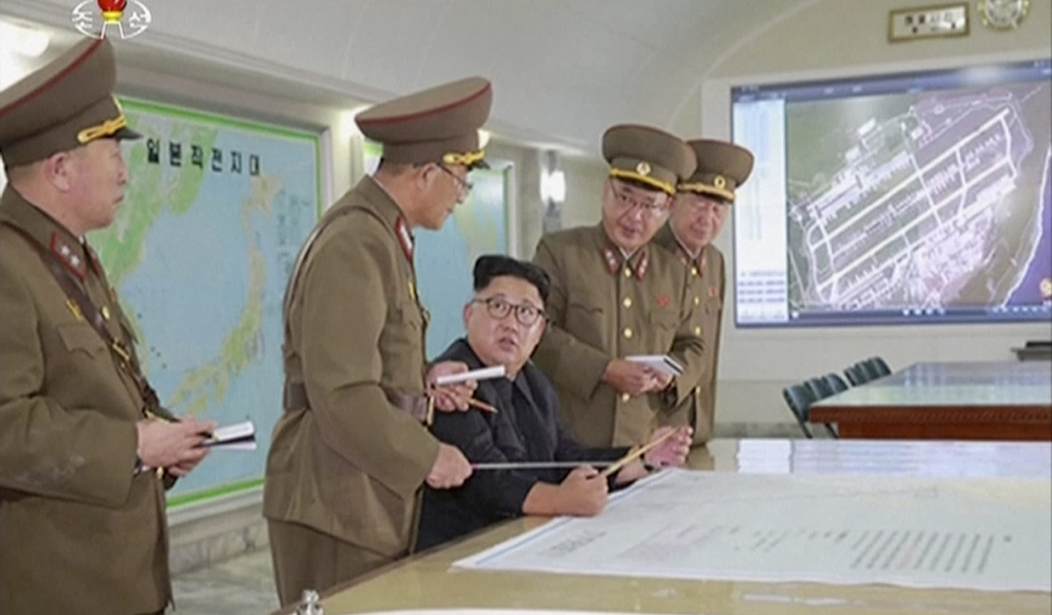Stressing that decisions on what to do if North Korea fires a missile at Guam can’t be fully made in advance, Defense Secretary James Mattis told reporters Monday that “war is up to the president, perhaps up to the Congress — the bottom line is we will defend the country from an attack.”
North Korea’s official Korean Central News Agency reported today that Kim Jong-un visited the Command of the Strategic Force of the Korean People’s Army (KPA) on Monday and “listened to General Kim Rak Gyom’s decision on the Strategic Force’s plan for an enveloping fire at Guam at the command post.”
“He examined the plan for a long time and discussed it with the commanding officers in real earnest. He praised the KPA Strategic Force for drawing up a close and careful plan as planned and intended by the Party and examined the firing preparations for power demonstration,” the KCNA report continued. “After listening to the commander of the Strategic Force that it is waiting for the order of the Party Central Committee after rounding off the preparations for the enveloping fire at Guam, he said with great satisfaction that the spirit of Hwasong artillerymen is very high and he was freshly determined, seeing by himself the combat preparedness and the sky-high spirit of the Hwasong artillerymen of the large combined unit… He said that if the Yankees persist in their extremely dangerous reckless actions on the Korean peninsula and in its vicinity, testing the self-restraint of the DPRK, the latter will make an important decision as it already declared, warning the U.S. that it should think reasonably and judge properly not to suffer shame that it is hit by the DPRK again.”
Mattis said Guam “is well protected,” yet wouldn’t venture into hypotheticals as “we’re the strong silent type in the military.”
“We’ll know if it’s going towards Guam within moments,” he said, adding, “I think if they fire at the United States, it could escalate into war very quickly, yes. That’s called war, if they shoot at us…. If they do that, then it’s game on. We’re going to try our best to make sure it does not hit the United States. But we’ll know if that’s where it’s going.”
If a missile falls into the water short of Guam, as North Korea has openly discussed, “it becomes an issue that we take up however the president chooses.”
“You can’t make all those kinds of decisions in advance. There’s a host of things going on. There’s allies that we consult with, as the president made very clear last week. We talked about our allies repeatedly in a statement. That’s something we have to think of. But we’re getting into hypotheticals and this sort of thing,” Mattis said.
He would not comment on Russia aiding North Korea in their ballistic missile development.
“We will defend the country from any attack, from any time — at any time, from any quarter. And, yes, that means, for a lot of young troops, they’re going to be in a wartime situation. Welcome to reality,” he said. “But it is not declaring war. It’s not that I’m over here, you know, Dr. Strangelove, you know, doing things like that, OK?”
Asked if President Trump had discussed his threat of using military force against Venezuela with the Pentagon before saying it, Mattis replied, “I’d prefer not to answer that.”
Sen. Chris Coons (D-Del.), a member of the Foreign Relations Committee, told CNN on Monday that “if a missile is launched at Guam and we have the capability, which I believe we do, we should knock down the missile.”
“It is completely appropriate for us to use a defensive missile system to disable an incoming, aggressive nuclear — excuse me, North Korean ballistic missile. Because we won’t know whether it’s a dummy missile or an armed missile until it hits and we won’t know exactly where it’s targeted, the waters off of Guam or hitting Guam itself until it comes down,” Coon said. “The trajectories that an ICBM typically follows are very steep and we would only have a manner of minutes to make a judgment call.”








Join the conversation as a VIP Member